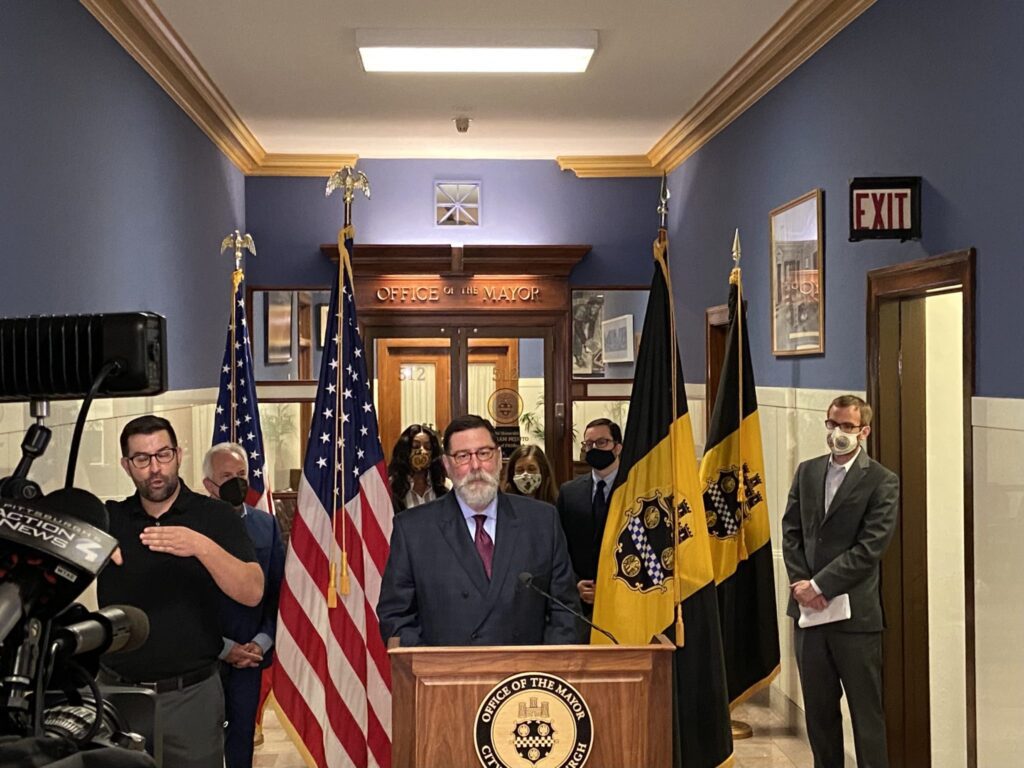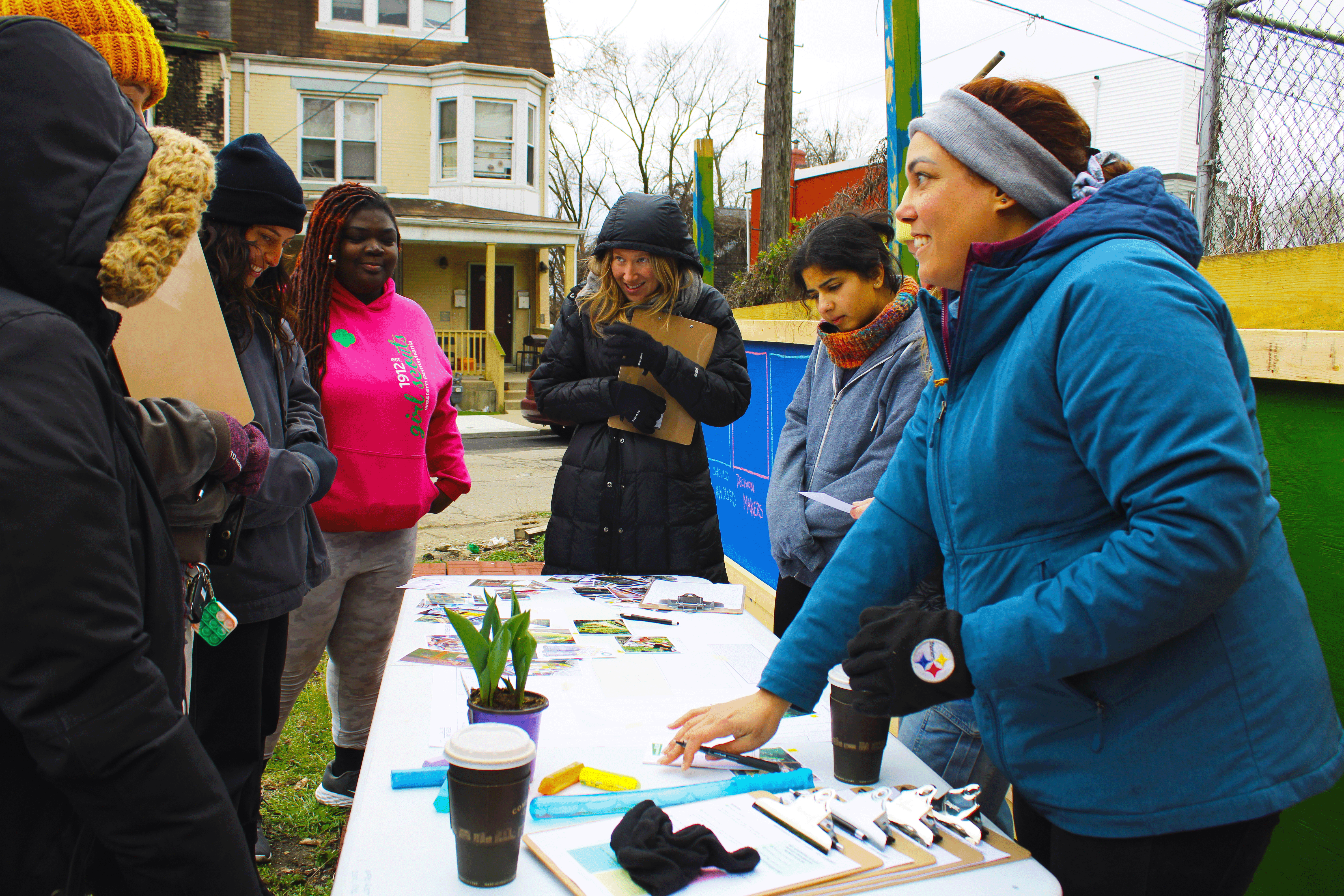By Rich Lord | Public Source | May 7th, 2021 | Read the full story
The medical giant’s recently announced involvement in housing alongside OnePGH is driven as much by emerging understanding of the ‘social determinants of health’ as by local pressures.

UPMC’s logo atop the U.S. Steel Tower, Downtown, as seen from Webster Avenue in the Hill District. (Photo by Ryan Loew/PublicSource)
UPMC’s involvement in meeting Pittsburgh’s affordable housing needs, touted last week by Mayor Bill Peduto as part of his OnePGH plan, is an extension of an effort that has been evolving since 2017 and involves a mix of charity, favorable loans and potentially profitable investments.
Peduto last week announced $115 million in ongoing or emerging partnerships with UPMC, Highmark Health, the University of Pittsburgh and Carnegie Mellon University, characterizing them as consistent with his administration’s efforts to bring nonprofit resources to bear to address a host of city needs.
The administration’s press release described the biggest piece as follows: “UPMC will invest $40 million in a new affordable housing program.”
The vast bulk of that investment is coming from the UPMC Health Plan side of the medical giant, its officials told PublicSource in an interview Thursday. A new, informal coalition created to preserve affordable housing, spurred by UPMC Health Plan’s growing interest in housing, may guide some of the investments.
That arrangement — voluntary infusions of funds outside of democratic control — isn’t likely to quiet community voices who say UPMC should make tax-like contributions to local priorities.
The medical center and insurer’s involvement stems from a deepening understanding of the connection between housing and health, according to Kevin Progar, a senior project manager at UPMC Health Plan. Research increasingly points to the importance of the social determinants of health — the ways one’s surroundings and economic circumstances affect well-being — and housing is at the center of that.
When too much of a household’s income is dedicated to housing, Progar said, people tend to defer medical care and other healthy priorities. “When people have higher quality housing options and a chance at opportunity, they’re more likely to succeed, to be healthy and to have a higher quality of life,” he said.
An early housing investment
In 2017, as the Peduto administration was outlining the city’s needs in the early stages of its OnePGH process, UPMC Health Plan was independently beginning its foray into housing.
UPMC Health Plan invested $20 million in a fund created by Omicelo, a for-profit firm based in the Hill District that focuses on housing, health and wealth-building efforts.
UPMC’s investment in Omicelo is helping neighborhoods facing gentrification and other housing pressures, said Raymond Prushnok, executive director of the UPMC Center for Social Impact. He added that UPMC considered the investment to be consistent with its mission, but also anticipated returns competitive with other investments.
Omicelo President and CEO Joshua Pollard said some of the investment has gone toward affordable housing or “workforce” housing within reach of blue-collar families in Homewood and the Hill District. He added that some of the fund was invested in other cities. He declined to specify those cities, to say how much of the money has been invested within Pittsburgh or to indicate how many housing units were created within the city.
He added that UPMC Health Plan has also donated to a related nonprofit entity, Omicelo Cares, which is helping to prepare city residents to buy homes and business sites. “We’re going into neighborhoods that need investments,” he said, “not just investing in the assets, but investing in the people.”
A big enough commitment?
More recently, UPMC Health Plan has committed $15 million to an emerging list of efforts to save and create affordable housing in city neighborhoods. Progar listed nonprofits Bridgeway Capital, ACTION-Housing, the Hazelwood Initiative and the City of Bridges Community Land Trust as some of the partners on those investments, which would not be expected to make market returns.
That $15 million commitment, plus anticipated coming pledges over the next five years, make up the bulk of the $40 million the mayor announced, said Dan Gilman, chief of staff to Peduto. He said UPMC’s investment with Omicelo was not counted in the $40 million because it started years ago.
“We have already begun discussions [with UPMC] about additional partnerships to leverage more dollars to invest in thousands of units in the city of Pittsburgh,” Gilman said Thursday.

Pittsburgh Mayor Bill Peduto, with Chief of Staff Dan Gilman to his left, announces the OnePGH commitments on April 29, 2021, in the City-County Building. (Photo by Rich Lord/PublicSource)
Prushnok said UPMC is committed to making more investments in affordable housing in Pittsburgh, though it’s too early to provide specifics.
A critic of UPMC said that even a $40 million commitment doesn’t address the affordable housing gap — or approach the benefit the healthcare giant gets from its tax-exempt status.
“Every bit helps, but we do need to get to a much larger-scale investment and make sure that the corporations in our community pay their fair share,” said Jennifer Rafanan Kennedy, executive director of Pittsburgh United, a progressive coalition of labor, faith community and environmental groups.
She said UPMC, if taxed like a business, would likely pay local governments $40 million every year. A series of voluntary affordable housing measures “looks even more like the Amazons of the world, who are giving back a tiny fraction of their massive wealth to projects which in many cases give them a return.”
Group therapy for the housing market
UPMC’s housing commitments are likely to be influenced by a coalition called the Preservation Working Group.
UPMC Health Plan first reached out to nonprofits Neighborhood Allies, ACTION-Housing and Bridgeway Capital. Late last year, their conversations led Neighborhood Allies to convene the working group to discuss ways to keep intact various pieces of the region’s affordable housing portfolio.
Much affordable housing is built with government funding that requires affordable rents for set periods of time, and the expirations of those commitments can lead to higher rents or redevelopment.
“If we don’t preserve what we already have, creating new housing doesn’t do much good,” said Matt Madia, director of real estate services for Neighborhood Allies, who leads the working group.
Madia said that City of Bridges, the nonprofit Rising Tide Partners, The Heinz Endowments*, the city’s Urban Redevelopment Authority, the local office of the federal Department of Housing and Urban Development, the Pennsylvania Housing Finance Agency and Regional Housing Legal Services have joined the conversation, and he expects the group to expand.
Madia said a next step for the group might be to develop some financing, “hopefully from UPMC,” that will help community-minded buyers to purchase and rehabilitate affordable housing.
Aiding homeless members
In response to questions following the mayor’s announcement, UPMC last week listed housing help it provides to people it insures as part of its OnePGH commitment.
UPMC Health Plan contracts with nonprofit Community Human Services to help insured members who face homelessness to navigate social services, apply for housing aid and deal with landlords. That program was helping 20 people at the end of 2019, but is up to 60 today, Prushnok said.
The insurer also has a team that helps patients who leave nursing homes only to find that they have lost access to housing or that they can no longer safely navigate their homes. The team can help to identify new housing or modify longtime homes.
Prushnok added that UPMC has made a $150,000 loan, at zero interest, and a $150,000 grant backed by the Robert Wood Johnson Foundation, to a URA program to help small landlords to improve their affordable properties.
Are UPMC’s affordable housing investments driven by the mayor’s OnePGH ambitions, community spirit or good business sense?
Prushnok said Peduto’s “vision is consistent with where we’re going,” and UPMC is glad to be part of OnePGH.
He also added that some of the efforts have “demonstrable value” to UPMC. “In other areas, those longer-term impacts may not be as measurable.”
*PublicSource receives funding from The Heinz Endowments.
Rich Lord is PublicSource’s economic development reporter. He can be reached at rich@publicsource.org or on Twitter @richelord.

